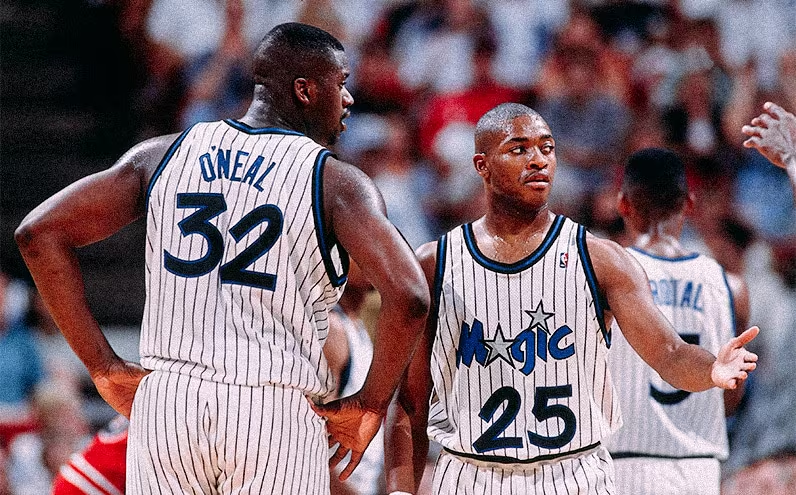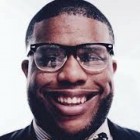
ORLANDO, FL — There are names in basketball lore that pop up like bookmarks in the margins of NBA history. Nick Anderson is one of those names. Not because of the controversies — though there were a few — but because of the candor. The truth. The honesty. As the first-ever draft pick of the Orlando Magic, Anderson represented an era of basketball where the stakes were high, and the pressure could either build a star or break one. He’s not remembered as the player who “blew it” in 1995, though some may only remember that moment. But he’s here now, reflecting back on the plays, the pressures, and the lessons learned.
1995 NBA Finals vs. Houston Rockets

It’s 1995. Game 1 of the NBA Finals. Orlando is leading the Houston Rockets, the defending champions, and it feels like the Magic are on the verge of something historic. Then, the unexpected happens. Nick Anderson, a 26-year-old rising star at the time, steps to the free-throw line with a chance to ice the game. He missed four consecutive free throws. The Rockets rally to win the game in overtime, and the eventual sweep of the Magic by Houston remains one of the more memorable “what-ifs” in NBA history.
“I’ma share this with you,” Anderson begins, his tone measured but filled with a certain weight that reflects years of reflection. “And I said this to some guys when I did another radio show… When I missed those four free throws against Houston, I would be lying on the other end of this phone to tell you that it didn’t affect me.”
For many athletes, the weight of failure at the most crucial moments can either push them toward growth or spiral them into self-doubt. Anderson chooses the former. He’s not one to make excuses.
“It affected me because I’m out there trying my best and it didn’t happen,” he continues. “Look at the stage I was on at the time. I was young. Did it affect me? I’m man enough to say, ‘Yes it did affect me in some ways.’”
And that vulnerability is rare in a world where athletes are expected to be impervious to criticism and failure. But Anderson doesn’t shy away from his feelings. In fact, he confronts them head-on. “I started questioning my ability and all that. I started questioning if I wanted to shoot this shot… I admit it, I didn’t. But instead of me working on it, I let it get the best of me.”
What could have been a fleeting moment of doubt has lingered for decades, an echo that Anderson carries with him. But he doesn’t regret the journey. He just wishes he had handled things differently. “And then like I said, I’m man enough to admit this – I should’ve gotten some type of therapy for it. I should’ve. I never did.”
The idea of seeking help, whether for mental health, self-doubt, or emotional processing, is something that many athletes didn’t consider during Anderson’s time. It’s a testament to his growth and openness that he can now reflect on how he might have approached the situation differently.
Nick Anderson never ran from his truth. But there were moments when that truth was misinterpreted.
Michael Jordan 45 vs. 23

Anderson is known for his honesty, but even his most candid comments weren’t always taken in the spirit in which they were intended. Case in point: the infamous moment in 1995 when Michael Jordan returned to the NBA wearing the number 45 jersey. Following his first retirement, Jordan came back to play with the Bulls late in the season, and the Magic, with Anderson playing a key role, took the defending champions by surprise in their playoff match-up.
It was during this time that Anderson was asked about the difference between the Jordan of #45 and the Jordan of #23, and his response sparked controversy.
“I was just answering a question,” Anderson says with a sigh, his voice hinting at the frustrations of being misunderstood. “The question was taken out of context. I don’t know how many games it was that MJ only had played. I think it wasn’t that many. And of course, I had a full season. He didn’t have a full season. So he didn’t have his legs like anybody else would. But, they took [it] as though I was saying, ‘Number 45 can’t play like 23.’… That was said, that’s how it was taken, so I had to live with it.”
Anderson wasn’t disparaging Jordan’s skills; he was just giving an honest assessment of the situation. But in the world of soundbites and media sensationalism, those words took on a life of their own.
Because of how the story broke, the fallout was inevitable.
“Because it was already out there,” Anderson explains, recalling the media frenzy that followed. “And MJ, that’s my boy. There was NO ill intent towards him. But that’s how it was put out there.”
The confusion was amplified when Jordan eventually switched back to his iconic #23 jersey. Was it a response to Anderson’s comments? According to Anderson, it wasn’t as simple as that.
“Oh yeah he did! He did that but, the question was like I made it seem like I said 45 is nowhere near 23. You know as well as I know the media takes things and they take it out of context. They put [it] in the perspective that they wanted to deliver it in. But, it was out there, so I had to live with it. And that was that!”
Yet, despite the misunderstanding, Anderson and Jordan’s bond remained unshaken.
“After our careers were over, me and MJ used to hang out all the time,” Anderson says. “I lived in Atlanta and you know, Charles Oakley is my ace coon boon. All of us used to go out and enjoy ourselves – eat, cold beers… you know, just hang out. Just as close as you could be.”
Anderson further emphasizes the mutual respect they had, pointing to a gesture that only someone of Jordan’s stature could extend.
“Notice in those games, did you see what shoe I had on? I had the X’s with the #25 on it. Why do you think the reason I had those shoes? He picked me as one of the guys to wear his shoes when he retired. C’mon now.”
“It was because of MJ; not because of Nick Anderson, it was because of MJ,” Anderson continues, his voice softening with gratitude. “That’s my dude and I have the utmost respect for him. Did we compete? Yeah! But there was no ill will that I had against MJ.”
Houston Rockets Dynasty in the 90s vs. Chicago Bulls Iconic 90s

Ask Anderson about the hypothetical dynasty of the ’90s Bulls, and he’ll give Houston its due.
While Anderson has made his name playing against the very best, he doesn’t shy away from acknowledging the challenges posed by a team like the Houston Rockets. For him, the Bulls’ run of dominance might have met its match in Hakeem Olajuwon and the Rockets.
“That’s a great question,” Anderson says, not hesitating for a second. “I’m going to take Houston. What they possessed and the challenges they gave teams. First of all, it starts with Hakeem in the middle. And look what he had around him – and I think Sam Cassell is one of the most craftiest point guards to play the game of basketball. Robert Horry could shoot the outside shot.”
There were specific matchups that Anderson thinks would’ve been tough for the Bulls to handle.
“You know, I believe him and Pip would have been going at it, and Clyde and MJ but, who were you going to have to battle with Hakeem in the middle… that’s what you look at. No one on that Bulls roster. So that’s where the challenge is. I personally think we’re going to be right there. Who was going to challenge Hakeem in the middle?”
Nick Anderson on Today’s NBA & Social Media

Anderson has seen the game evolve. But he also wonders what it would’ve been like if his voice had the same platform today’s athletes do.
Reflecting on the state of social media, Anderson knows the power it holds — a power that would have helped him in those days when a single misunderstood quote could spiral out of control.
“I would have had more people that would have been able to hear my side, what was actually said,” he admits. “See, the young guys today have it so good, you can go back and really deceive.”
Yet, despite all the changes in the game, Anderson stands firm in his belief about who truly stands at the pinnacle of the sport.
“I’ll say this with all due respect to all the guys that I played against in the league, all of ‘em – Michael Jordan is the BEST basketball player I’ve ever faced. Ever. Like I said, no disrespect to any other player that I’ve ever faced. That’s just my opinion.”
LeBron James, Michael Jordan & Kobe Bryant

He respects LeBron James, of course, but he’s not swayed by the endless debate.
“I’m a LeBron James fan to no end, but there will never be another #23.”
And as for Kobe?
“Kobe was a foot from being in the door. A half a foot. Did you hear when MJ gave his speech at his memorial; that Kobe would call him 24/7 picking his brain?”
Anderson has a message for today’s players, especially the younger generation: Don’t forget those who came before you. Seek guidance, because there’s always more to learn.
“There’s nothing wrong with doing that. Trying to pick somebody’s brain, somebody you want to emulate or want to be like him… Everybody needs somebody. Whether you want to admit it or not. I needed somebody to show me the way.”
Anderson speaks from experience, a hard-earned wisdom that’s shaped his perspective on both basketball and life.
“Respect the game. Respect those who came before you because young brother and young sister, for you to have what you have, somebody sacrificed. You’re reaping the benefits, bruh!”
“See, I’m telling you from experience. I’m not telling you from what somebody told me. Experience is a teacher, boy. Always have been, always will be. Listen.”
Nick Anderson isn’t a cautionary tale. He’s a testament.
To growth. To friendship. To hard truths. And to a legacy that deserves far more light than it gets.

